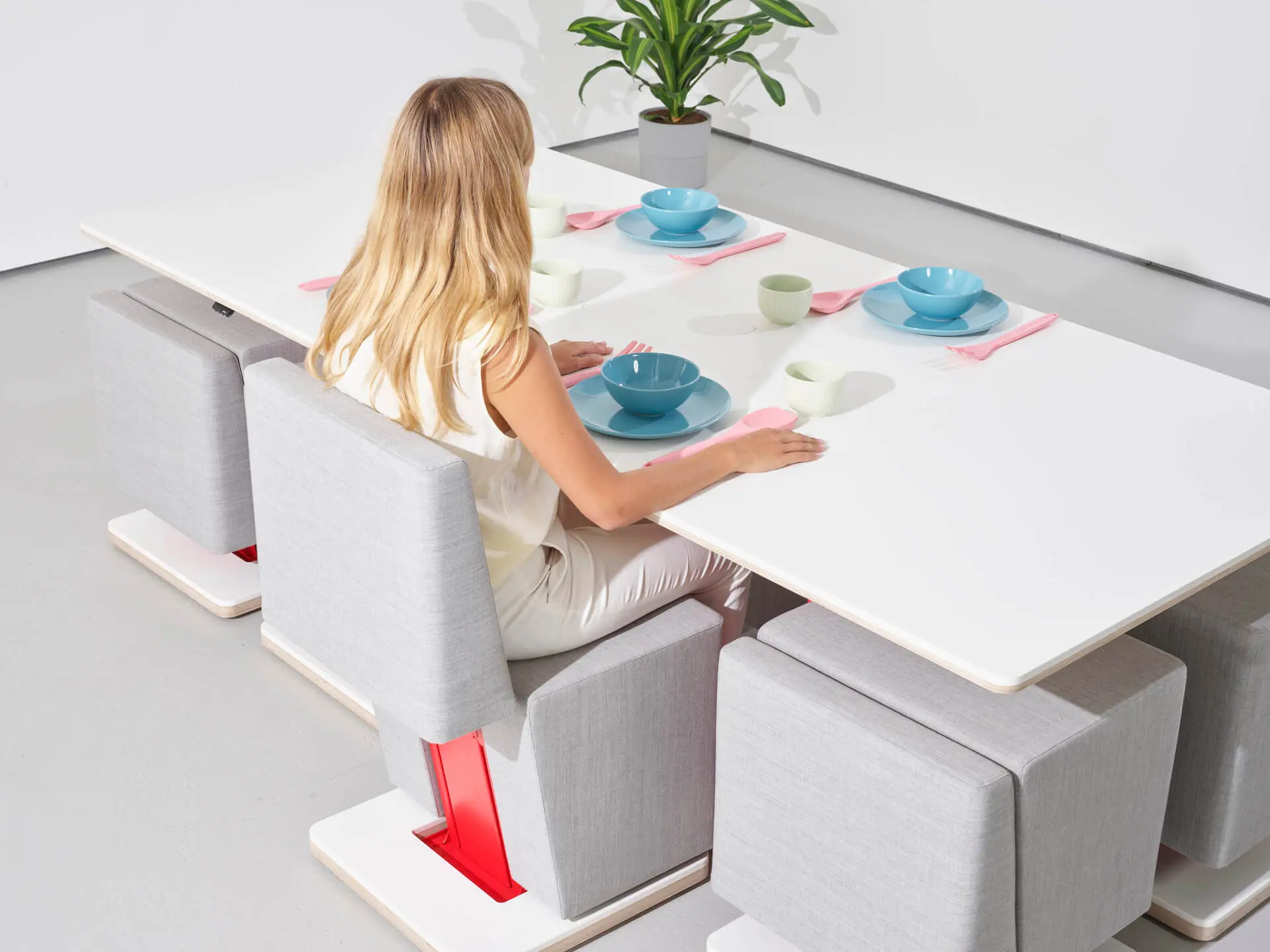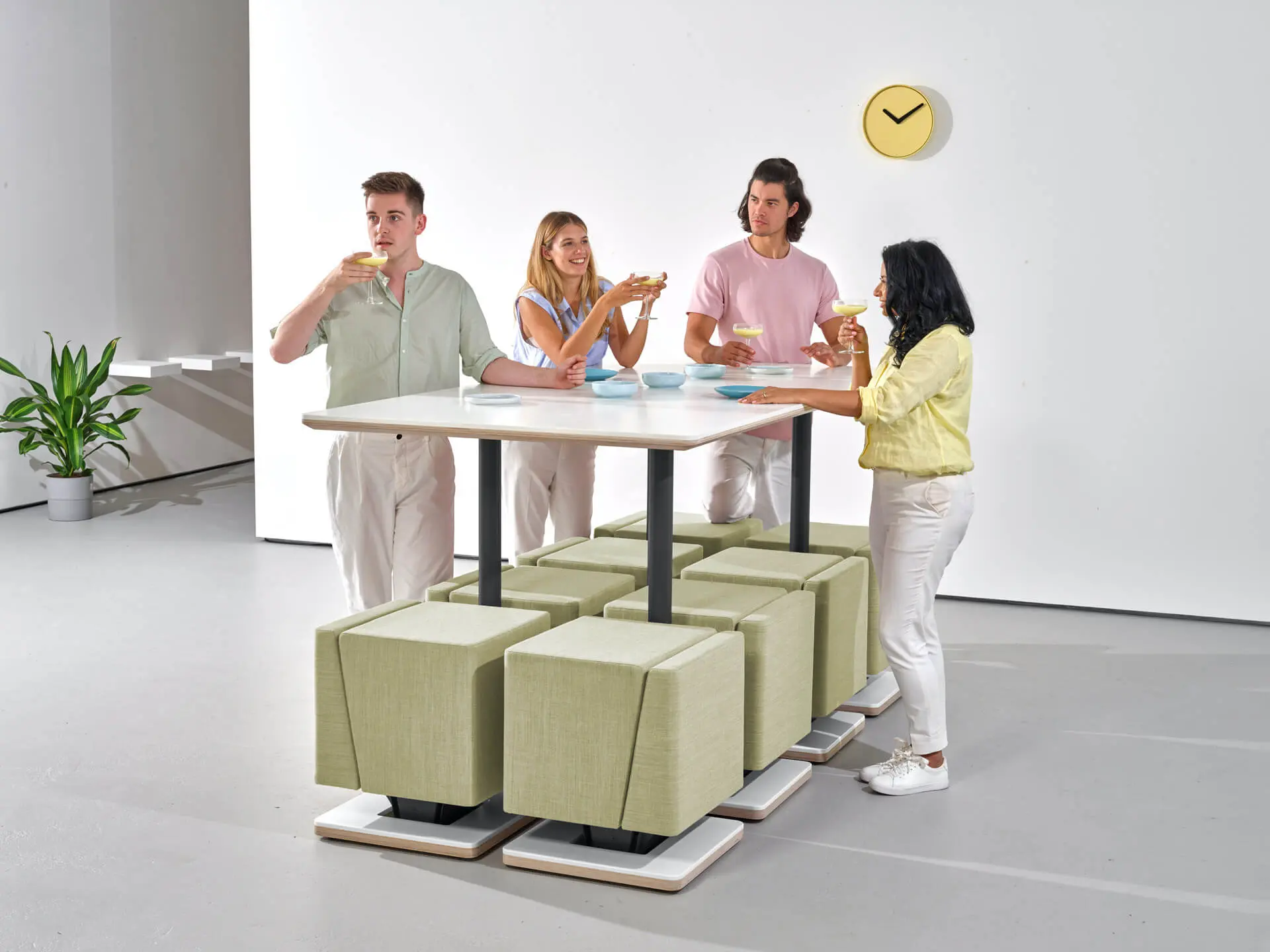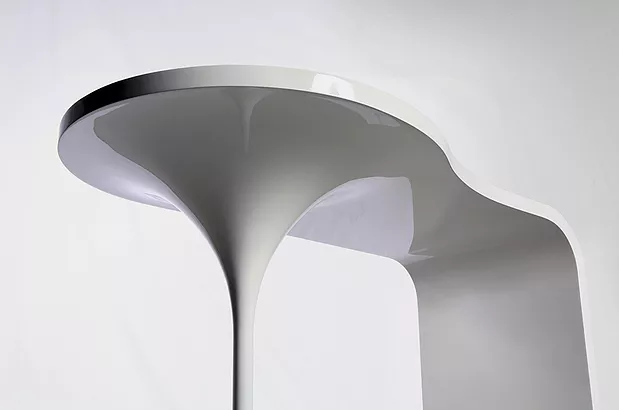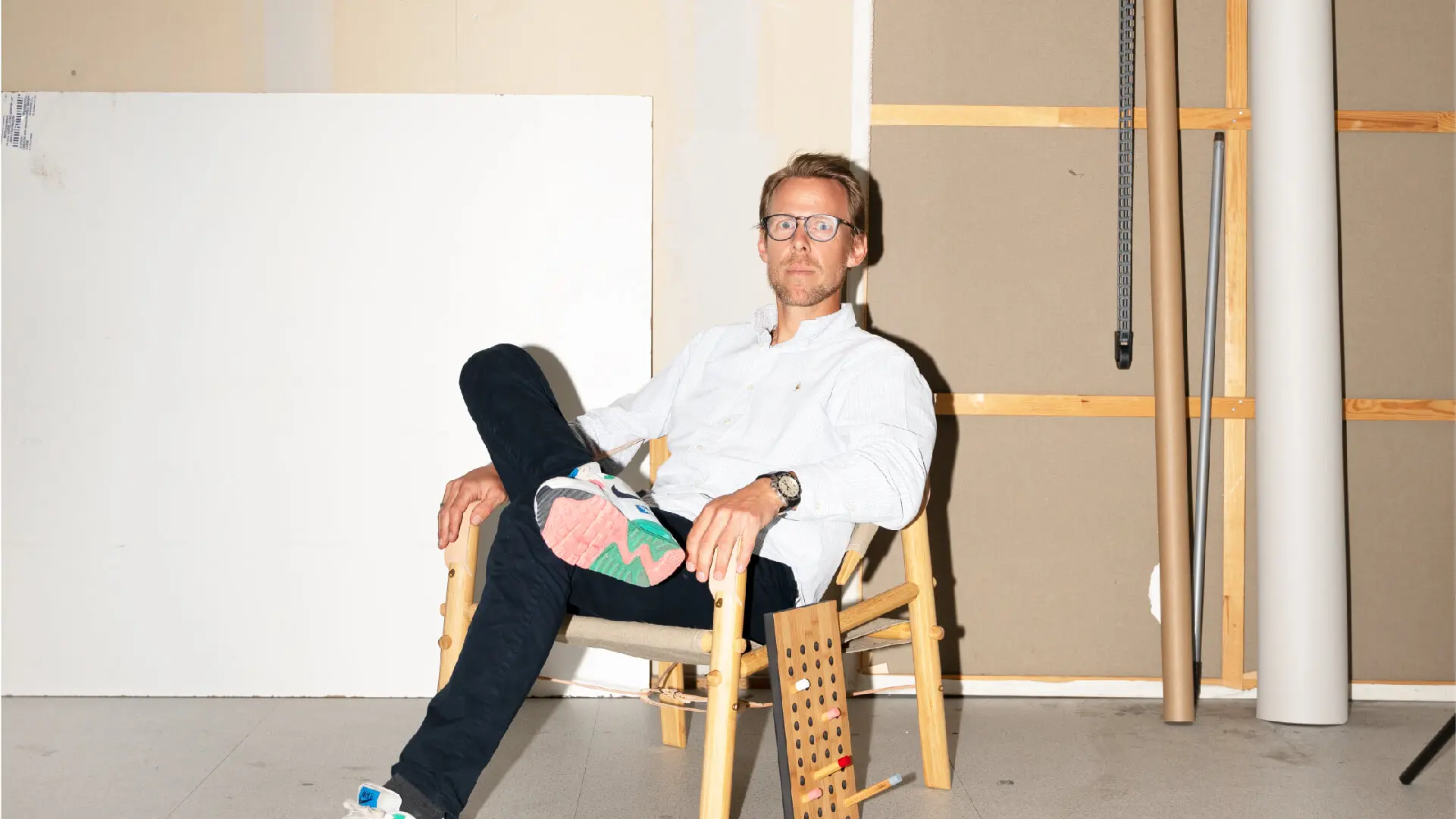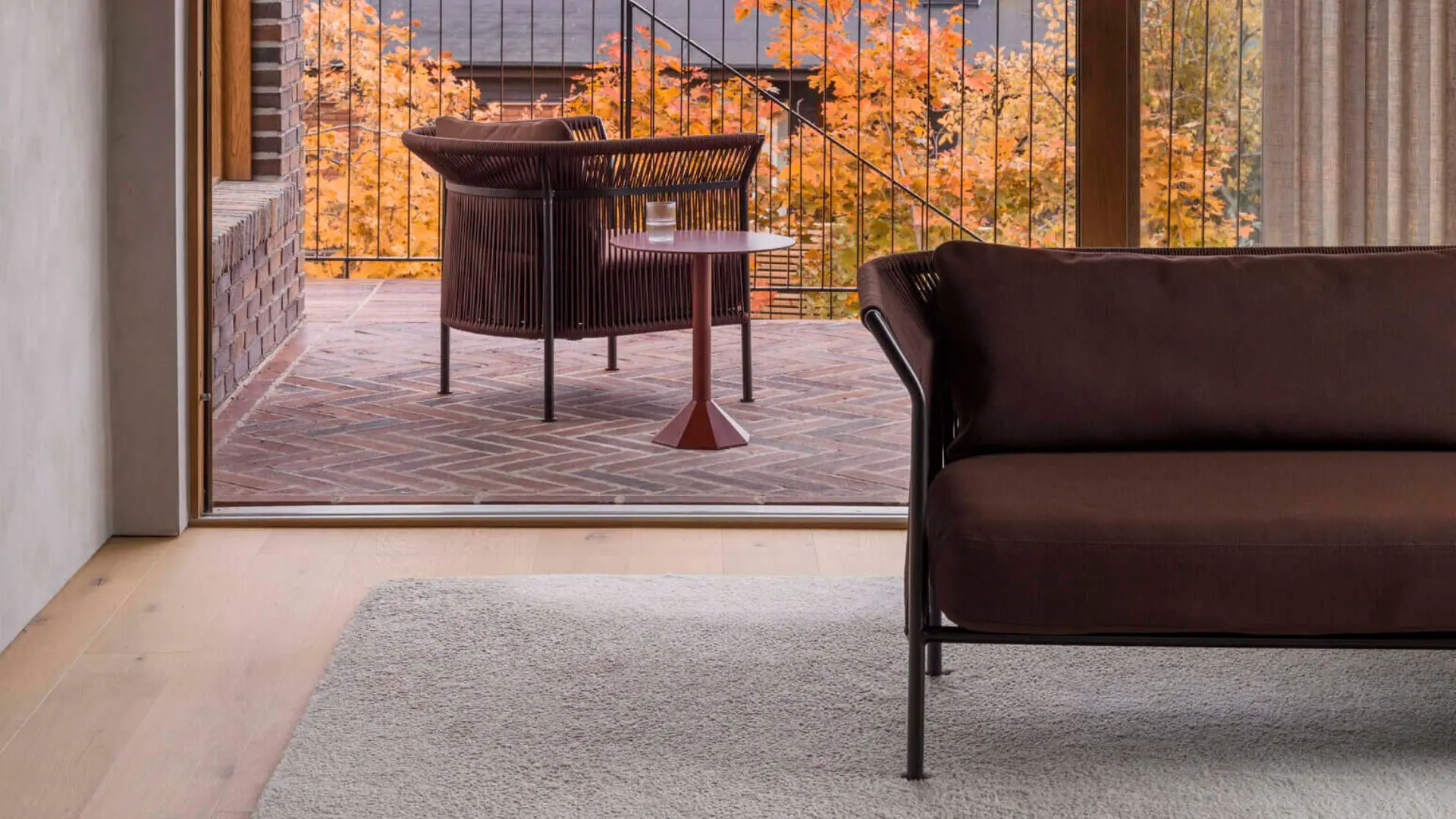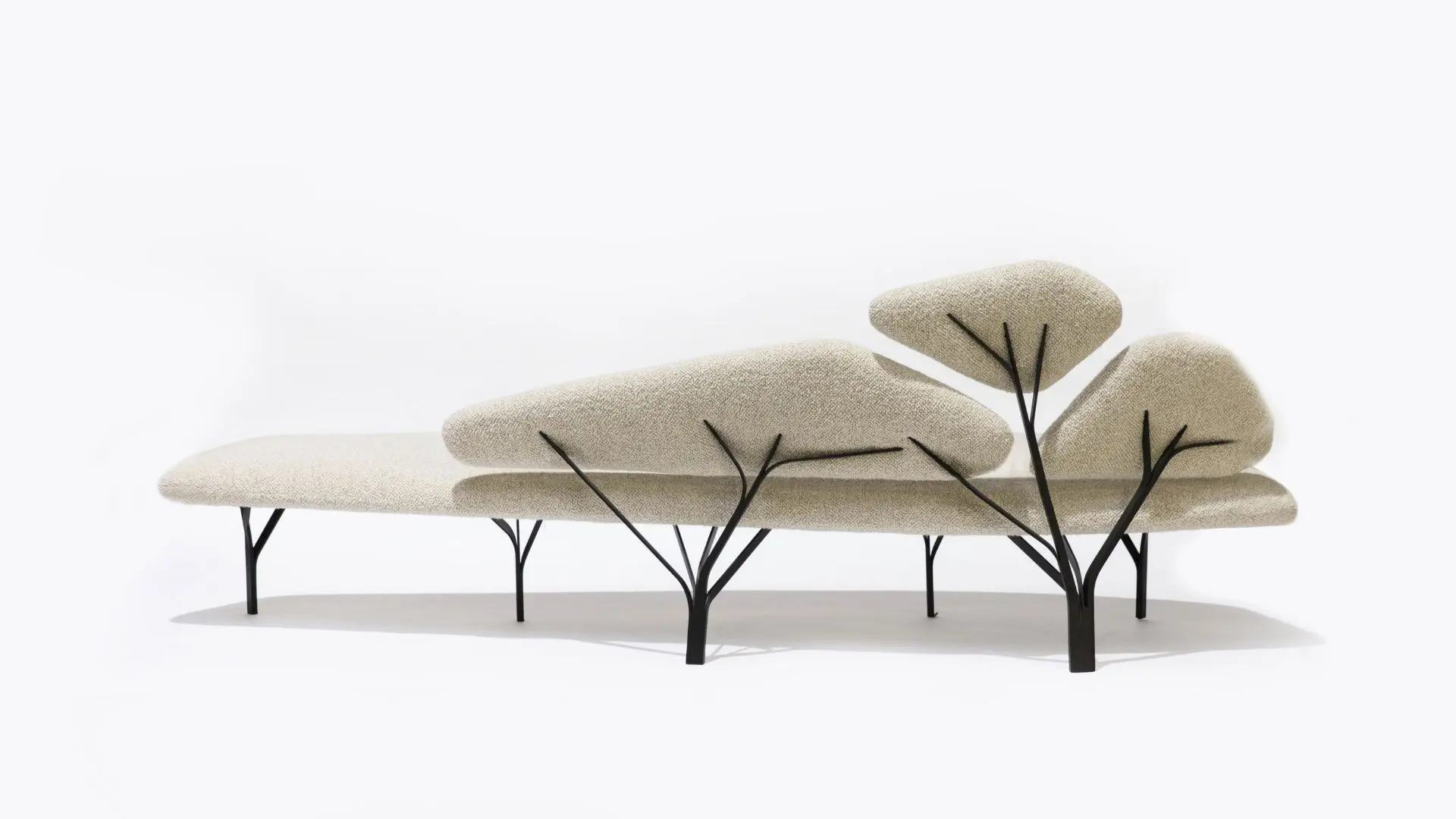‘Designing for Spaceships’ with Joyride
Through an innovative approach to furniture, London-based design studio Joyride created the world’s first responsive furniture system suited for diverse space needs.
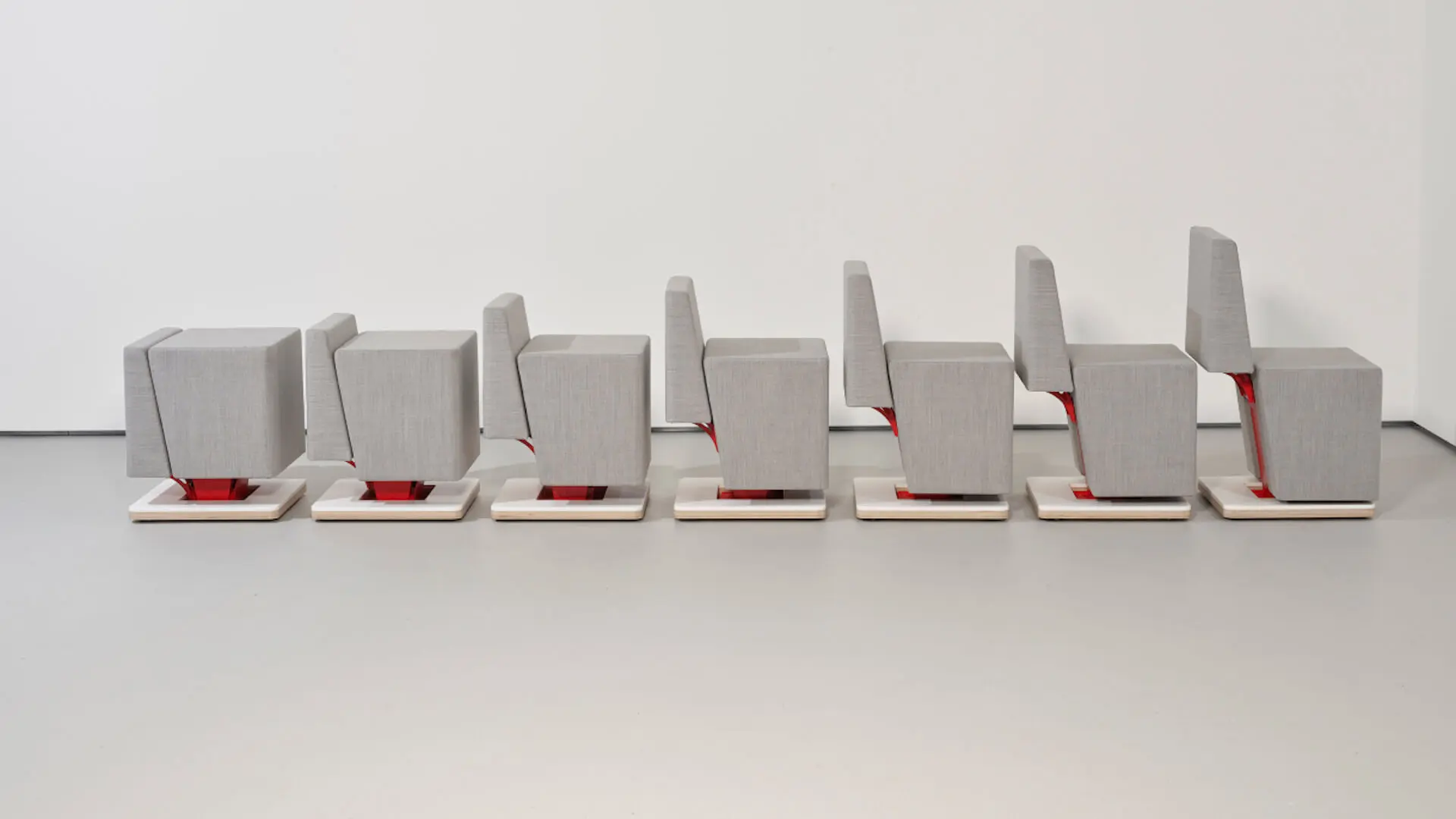
Furniture has become an important part of our daily life, we find a plethora of options for every style, every space, and every size, and while the options are infinite, they all seem to be designed with the same premise: to be static and satisfy a specific use. But as our lives and spaces change, our use of furniture changes as well; we no longer use these objects for the purpose they were designed for, we’ve adapted them to be used in a variety of ways, from dining to working, entertaining, cooking, seating, you name it, we’ve all done it.
So, isn’t it time for our furniture to be as multipurpose, multifaceted, and multifunctional as our lives? While most designers and studios follow the same criteria for designing furniture, we find very few that break the scheme and design from a completely clean slate, among those few we find Joyride.

Founded by innovator James Lucas, Joyride is a design studio focusing on creating multifunctional responsive furniture systems suited for every purpose. With their ‘design for spaceships’ philosophy, Joyride approaches furniture from an innovative and completely clean slate, forgetting all previous notions and re-imagining furniture fit for the future. By using the energy of the user to power a response in their designs, Joyride created the world’s first responsive furniture system, CUBA. The system is comprised of the CUBA Chool seating and the CUBA Surface, which when used together, they form the CUBA Hubstation, a perfect union that creates a highly optimized product that can adapt to any need and any space.
Excited by their bold, innovative, and incredibly functional approach to furniture, DesignWanted interviewed Joyride’s founder James Lucas to find out more about their incredible beginnings, revolutionary design, and what does it mean to ‘design for spaceships’.
Who is James Lucas? How did the journey for Joyride begin?
James Lucas:
“Firstly and foremost I would describe myself as an innovator, a design-focused innovator. I’m interested in exploring problems that haven’t been tackled or addressed before. I focus on creating concept-driven solutions that are fun and engaging, highly expandable, and scalable. It’s always my hope that these concepts will lead to the growth of new sectors that I and others can explore. It goes without saying that taking on these concepts definitely come with their challenges, and I seem to love a challenge. Although I have definitely questioned my sanity during this process. Taking on all aspects of the project, from design concept through production, branding, and commercialisation has definitely stretched me. However, it’s partly this challenge that inspires and motivates me day to day. Pushing a new concept to market, working hard to make it accessible, so that it could hopefully help to inspire others to think differently and create solutions to problems and challenges in their own worlds.
Joyride came about because the biggest risk was to take the safest option. After we came up with the idea of responsive furniture and realised how expansive the idea of using the energy of someone sitting down to power a response in the seat was; the simplest being a backrest or screen coming up. We managed to secure an incredibly strong global IP patent on the concept protecting us in all major markets. This gave us the springboard to start talking to furniture brands.
When we approached all the big players they were all keen to work with us but they wanted all the IP to themselves. They wanted to do things their way, which we really didn’t want to do or worst still, the arrangements left room for them to potentially just shelve the concept, the designs, to never see the light of day. Maybe if I wanted an easy life it would have been the best thing to accept those terms, but it went against everything I stood for. Plus, where’s the challenge in that. So, after a while of developing lots of different concepts, testing them from a design and engineering point of view we realised we could do it ourselves and prove to the value of this concept using our own rules. Voila! Joyride was born.
What’s great is Joyride is like our playground. We have the freedom to do what we like with responsive furniture to inspire other designers, architects, and other brands to want to work with us.”

Joyride is about designing for spaceships, what is the main focus of this design philosophy?
James Lucas:
“Designing for spaceships is a fun and inspiring design approach which perfectly encapsulates everything I believe in when it comes to design. It’s about forward-looking design. Taking a first principle viewpoint on every design challenge we embark on. To forget what has gone before. Designing for Spaceships reminds us to be ambitious; it’s quite literally aiming for the stars. It’s bold and daring; it’s about pushing boundaries and taking risks. Not to mention the themes of fusing technology with purpose and keeping things beautifully simple and functional. And spaceships are the ultimate test of space optimisation. Which is a big design purpose for the Cuba Product System.
But importantly Designing for Spaceships is tongue-in-cheek. It reminds us to keep it fun, to not to take it too seriously. I mean who doesn’t love spaceships. And when we are an intergalactic traveling race, imagine what fun furniture objects could make our lives better. I want to give people more choice, more opportunities, more optimisation. This sounds a bit dry but really it’s about helping people do more with what they have. Ultimately give people a better quality of life, by creating inspiring objectives and environments that are a joy to engage with.
Looking back I feel that design and innovation have been part of me since the very beginning. I was always interested in how things work. I didn’t make a career decision to study design, I’ve always been designing and inventing. I’ve been fascinated with design, physics, motion, and mechanisms for as long as I can remember. These passions have always been my driving force, it has inspired me to teach myself and ask the right questions and to always challenge the status quo.

My journey to creating responsive furniture was born out of my stubbornness to not accept that just because something doesn’t exist we can’t create it. Like many of the people today I lived in a shared household, where my one room was my whole world. It was my bedroom, my wardrobe, my first office, television room… I used to watch tv from my computer that was on the table, that was also my work desk. In front was my office chair. With this massive backrest that used to obscure my view. So I had to get off the bed and move the chair so that the backrest doesn’t bother me anymore. Of course, being a bit of a perfectionist, I could always, from the corner of my eye, see the bloody thing, and it drove me insane. And Joyride, chool, responsive furniture is the result of this insanity.
I want to create exciting objects that not only better optimise environments, but objects that also inject a sense of fun and the unexpected into spaces. I want people to be surprised and delighted, to make people feel more connected to things around them.
Responsive furniture now is just at the beginning of its journey; an analogue beginning of a much more hi-tech future where Responsive Furniture would totally integrate into our environments. For example, in the future, nanotechnology might be in play and the floor would just come up and greet you as you go to sit down. I want to continue to work with skilled passionate people and see how far we can push the concept, whilst having a $#!+load of fun on the way.”

Your designs tend to push boundaries and take risks, which designers are you most inspired or influenced by? What other fields and inputs outside of the design world provide you inspiration?
James Lucas:
“My influences come from all sorts of places. I think that’s true of all innovators, creators, designers, probably everyone. We’re all constantly influenced by the world around us. But there are a few that really stand out. Christian Von Koenigsegg. He started the Swedish high-performance automobile manufacturer Koenigsegg. He’s done an amazing job with very little to enter a highly competitive market sector that is very complicated and succeeded against long-established motor giants.
Someone I’m frankly in awe with is Nikola Tesla. What that guy created in his lifetime is still unsurpassed and what he’s given to the modern age, there’s still no-one who has offered so many innovations that people are still using and developing.
Talking of Tesla, one person who has been an inspiration has been Elon Musk. Not just through his design and ideas but the way he approaches business and design. He’s a big proponent of first principle thinking which is something that has influenced me a lot when we set out to re-imagine the table and chairs which led to the inception of the Cuba Product System. It’s a powerful tool to forget everything you know in order to truly start from scratch.”

Thinking about tomorrow and aiming for the stars, if you had an unlimited budget and resources, which project would you develop?
James Lucas:
“If i had an unlimited budget, I would bring all the Spliced Studio Responsive Furniture designs and prototypes to fruition. A lot of love, sweat, energy, and tears have gone into them, not only for myself but from our supporters and team who have worked super hard on this bonkers journey.
I’m also passionate about exploring alternative ways that we can live, and very interested in creating energy independent ocean-going homes, with responsive interiors, obviously! Yachts that are powered by solar and kites, and can be as self-reliant as possible and very comfortable to live aboard, moored up, or at sea. Whilst being way more accessible to people than the current marketplace supports. The main thread is to use free, clean, accessible energy to explore this beautiful planet we have been entrusted with, and cram in a load of fun on the way.”
Joyride has an elegant and functional aesthetic approach to design. Which are the main values, core concepts, or style inclinations that, above all, will always represent the studio?
James Lucas:
“Joyride will always be unashamedly a fanboy of minimal, however we always like to bring a sense of fun and playfulness to our design. It’s important that it’s not only pleasing to the eye but it creates a more connected richer experience. It should bring a smile to your face. Like the first part of our name, where would life be without joy.”

Can you comment on a trend in furniture design?
James Lucas:
“Our main design mission with the Cuba product System was to create furniture that was better optimised for fluid multifunctional spaces. To help people get more out of the space they have. This has been highlighted by the ongoing COVID 19 pandemic, where suddenly we’re forced to work and live at home.
The lockdown has reaffirmed our belief that our spaces can be better optimised for switching between uses. Which is where I see furniture and interior design heading for the foreseeable future. More multi-functional work/living spaces at home with furniture that can respond easily and effortlessly to different uses.”
How does the future look for Joyride?
James Lucas:
“We’re just at the beginning of our journey but we’re excited about the possibilities. Our head is full of ideas but the next big mission is to tell our story and to get our products out to the wider design community. To start engaging and collaborating with furniture designers, architects, and interior designers, to really explore the potential of this new category of furniture; we’ve only just scratched the surface. Responsive furniture isn’t just confined to a cube. Imagine a mid-century responsive chair or a responsive sofa for the office. We have lots of other exciting concepts in the pipeline that we’re itching to get out.

But before we reveal those new designs, we’re about to launch our online store in the coming weeks. It’s been a massive epic project over the last couple of months. We’re in the final stages testing to make sure everything is tip-top and working seamlessly. When launched people will be able to configure and customize the products from 35+ styling options. It’s been a long time coming and we have to thank our really really patient followers. But finally, after our epic decade long journey here, the Cuba Product System will finally be available for purchase and be able to be delivered anywhere in the world. Coming very very soon.”






